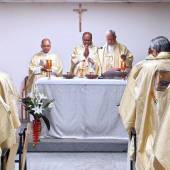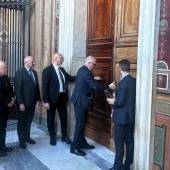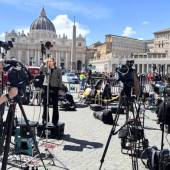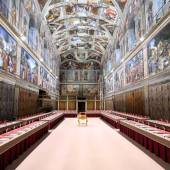Final General Congregation reaffirms Pope Francis’ reform legacy, urges communion and courageous leadership
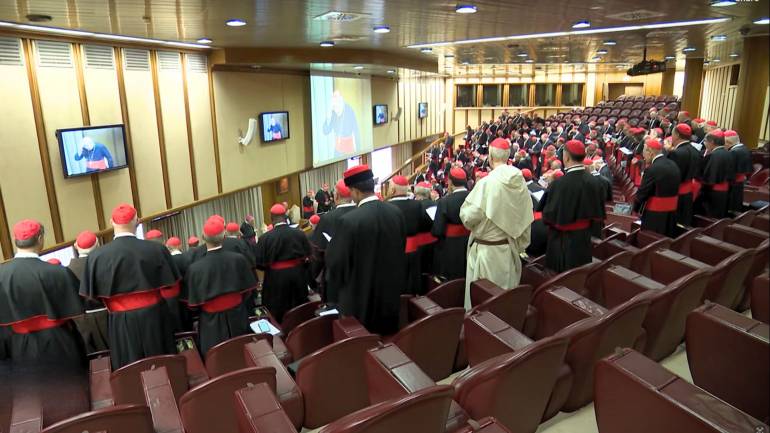
In a pivotal gathering ahead of the conclave, the twelfth and final General Congregation of Cardinals convened on May 6 at 9:00 AM in the Vatican.
As tradition dictates, the session began with a moment of prayer—invoking the guidance of the Holy Spirit as the Church stands at the threshold of a new chapter.
As many as 173 cardinals participated, including 130 electors who will soon enter the Sistine Chapel to choose the next pope. The session featured 26 interventions, rich in reflection and urgency, as cardinals voiced shared hopes and concerns for the future of the Catholic Church.
At the heart of the discussions was a strong reaffirmation of the reform agenda championed by Pope Francis. From the fight against sexual abuse to economic transparency, from the ongoing reorganization of the Roman Curia to deepening synodality, the commitment to peace, and the care for creation—cardinals underscored the need to sustain and build upon these key priorities. A sense of collective responsibility and moral urgency pervaded the room.
One dominant theme resonated throughout the morning: communion. More than a theological ideal, communion was lifted as the essential vocation for the next pontiff—a call for a shepherd who embodies compassion, unity, and pastoral closeness. The cardinals described a vision of a "teacher of humanity," a pope capable of reflecting the face of a Samaritan Church—near to the wounds of the world and attentive to the cries of the poor.
In a time marked by war, violence, and sharp ideological divides, the call for a spiritual leader rooted in mercy, synodality, and hope echoed with conviction.
Several contributions touched on canonical matters, including the nature and limits of papal authority and how the College of Cardinals can better support the ministry of the Bishop of Rome. There was also a sobering recognition of internal divisions within the Church and broader society—and an appeal to confront them with humility, dialogue, and unity.
Special attention was given to the World Day of the Poor, which precedes the Solemnity of Christ the King. Cardinals highlighted the theological and pastoral connection between the two celebrations, reminding the Church that Christ’s kingship is revealed through service and that His living presence is found among the poor.
Other key themes included the need for deeper participation in consistories, the promotion of Christian initiation, and ongoing faith formation as acts of authentic missionary outreach.
The session also honored the martyrs of the faith, especially in regions where Christians face persecution or restrictions on religious freedom. The worsening climate crisis was again raised as an urgent global and ecclesial emergency, calling for prophetic leadership and decisive action.
Topics such as ecumenical dialogue, the legacy of the Council of Nicaea, and the potential for a unified celebration date for Easter were also briefly discussed.
The Congregation concluded with a solemn act: the annulment of the Fisherman’s Ring and the lead seal, symbolizing the official end of the previous pontificate.
The cardinals read aloud an official declaration in the final moments. In it, the cardinals issued a heartfelt appeal to all parties involved in ongoing global conflicts. They called for an immediate and lasting ceasefire and the opening of genuine negotiations aimed at achieving peace based on human dignity and the common good.
With no further General Congregations scheduled, the College of Cardinals now turns its full attention to the conclave, which begins on May 7. Final logistical arrangements for the electors were confirmed during the session.
As the world awaits the sight of white smoke rising from the Sistine Chapel, the Church enters a sacred time of discernment—placing its trust not in predictions, but in prayer and the quiet work of the Holy Spirit.
Radio Veritas Asia (RVA), a media platform of the Catholic Church, aims to share Christ. RVA started in 1969 as a continental Catholic radio station to serve Asian countries in their respective local language, thus earning the tag “the Voice of Asian Christianity.” Responding to the emerging context, RVA embraced media platforms to connect with the global Asian audience via its 21 language websites and various social media platforms.









